(Doc) Similarities And Differences Between Entrepreneurial Ventures
VerifiedAdded on 2021/02/21
|17
|5004
|84
AI Summary
Contribute Materials
Your contribution can guide someone’s learning journey. Share your
documents today.
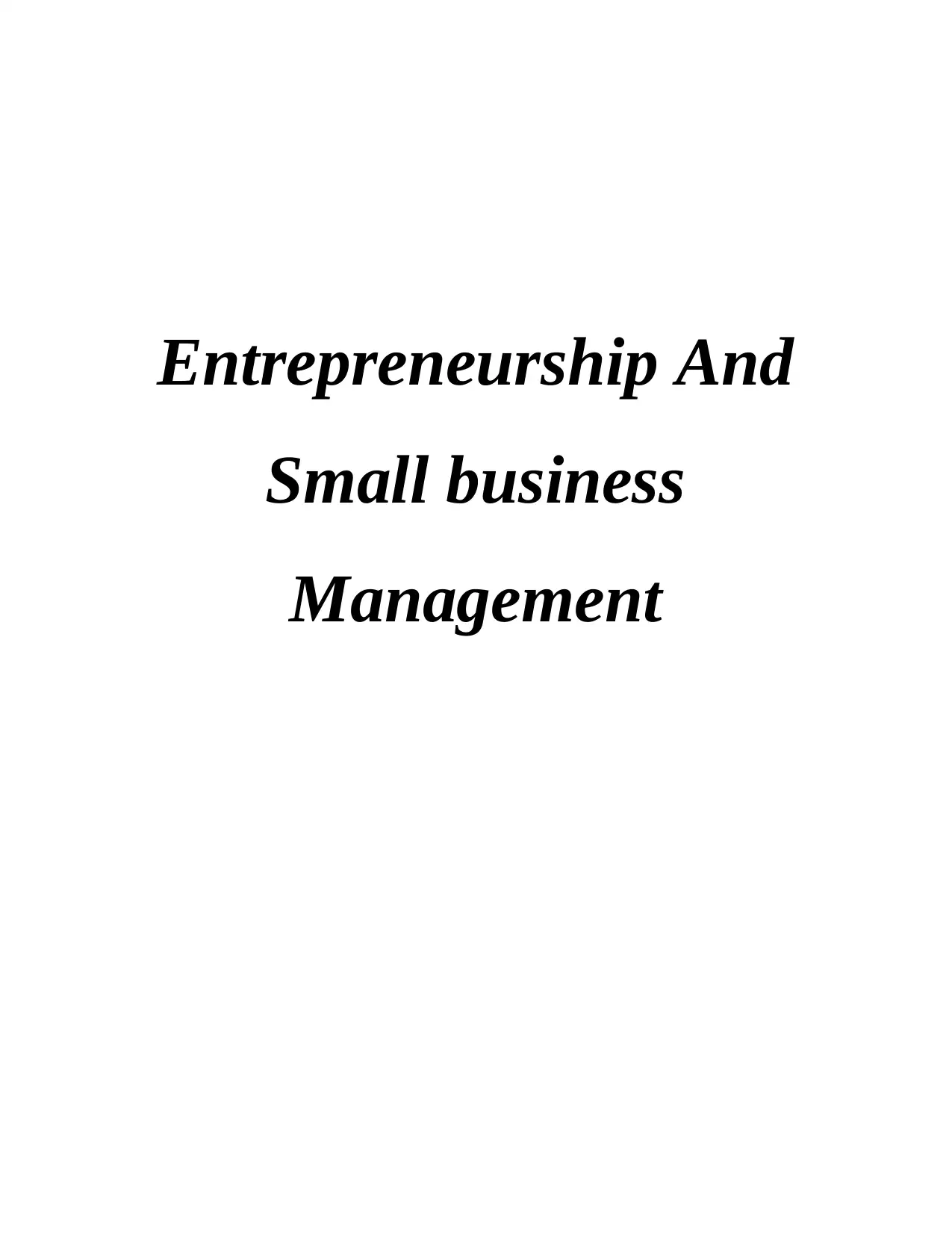
Entrepreneurship And
Small business
Management
Small business
Management
Secure Best Marks with AI Grader
Need help grading? Try our AI Grader for instant feedback on your assignments.
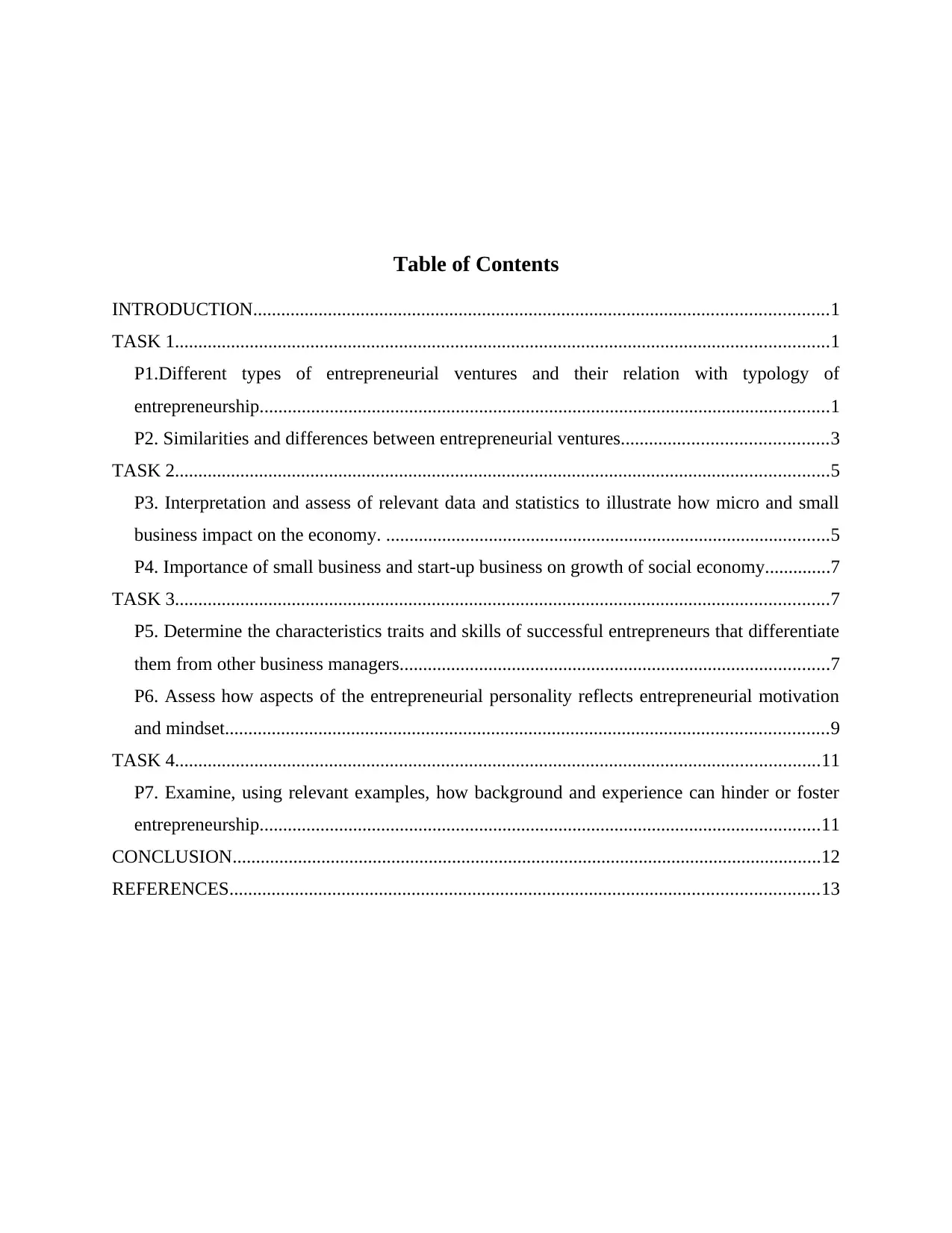
Table of Contents
INTRODUCTION...........................................................................................................................1
TASK 1............................................................................................................................................1
P1.Different types of entrepreneurial ventures and their relation with typology of
entrepreneurship..........................................................................................................................1
P2. Similarities and differences between entrepreneurial ventures............................................3
TASK 2............................................................................................................................................5
P3. Interpretation and assess of relevant data and statistics to illustrate how micro and small
business impact on the economy. ...............................................................................................5
P4. Importance of small business and start-up business on growth of social economy..............7
TASK 3............................................................................................................................................7
P5. Determine the characteristics traits and skills of successful entrepreneurs that differentiate
them from other business managers............................................................................................7
P6. Assess how aspects of the entrepreneurial personality reflects entrepreneurial motivation
and mindset.................................................................................................................................9
TASK 4..........................................................................................................................................11
P7. Examine, using relevant examples, how background and experience can hinder or foster
entrepreneurship........................................................................................................................11
CONCLUSION..............................................................................................................................12
REFERENCES..............................................................................................................................13
INTRODUCTION...........................................................................................................................1
TASK 1............................................................................................................................................1
P1.Different types of entrepreneurial ventures and their relation with typology of
entrepreneurship..........................................................................................................................1
P2. Similarities and differences between entrepreneurial ventures............................................3
TASK 2............................................................................................................................................5
P3. Interpretation and assess of relevant data and statistics to illustrate how micro and small
business impact on the economy. ...............................................................................................5
P4. Importance of small business and start-up business on growth of social economy..............7
TASK 3............................................................................................................................................7
P5. Determine the characteristics traits and skills of successful entrepreneurs that differentiate
them from other business managers............................................................................................7
P6. Assess how aspects of the entrepreneurial personality reflects entrepreneurial motivation
and mindset.................................................................................................................................9
TASK 4..........................................................................................................................................11
P7. Examine, using relevant examples, how background and experience can hinder or foster
entrepreneurship........................................................................................................................11
CONCLUSION..............................................................................................................................12
REFERENCES..............................................................................................................................13
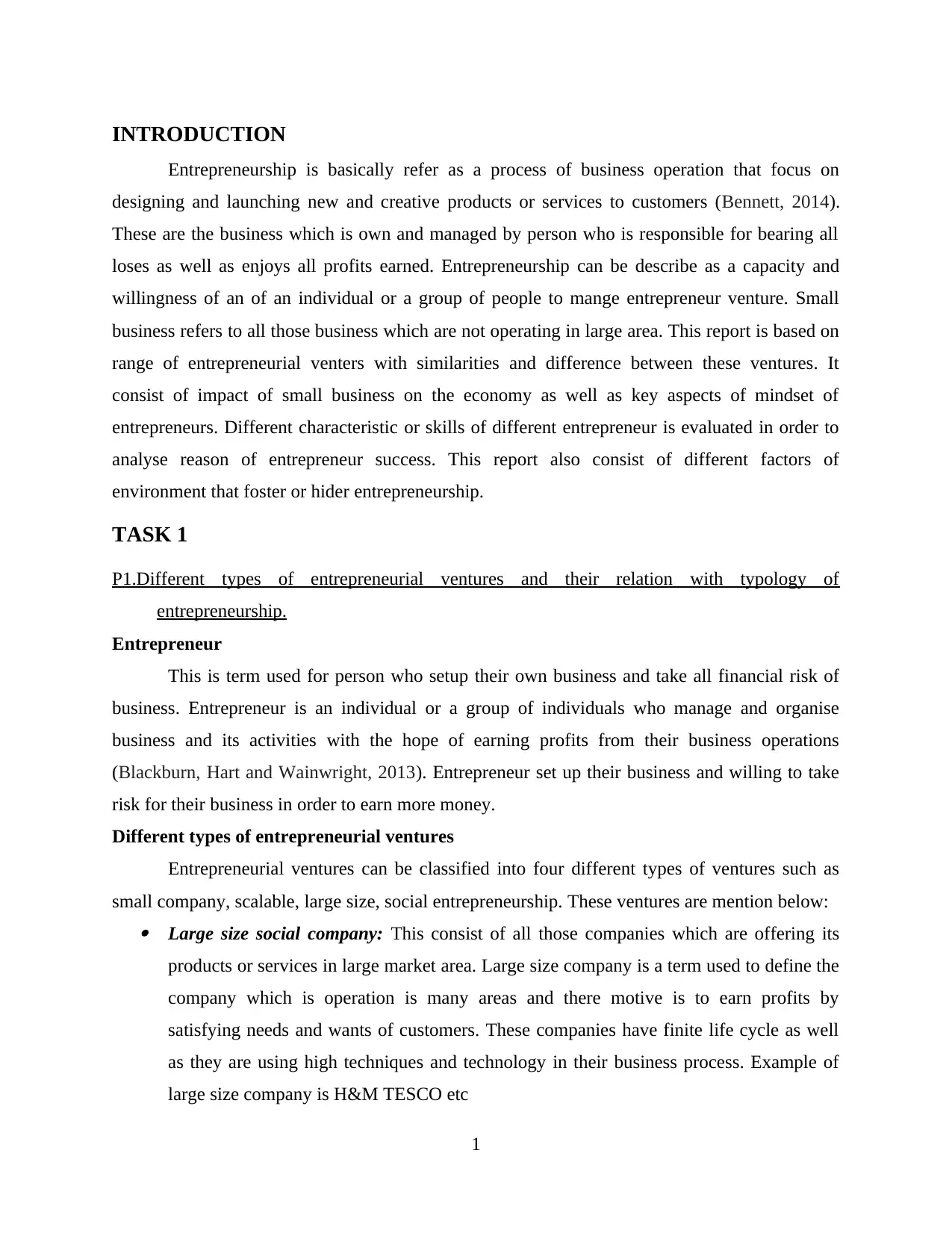
INTRODUCTION
Entrepreneurship is basically refer as a process of business operation that focus on
designing and launching new and creative products or services to customers (Bennett, 2014).
These are the business which is own and managed by person who is responsible for bearing all
loses as well as enjoys all profits earned. Entrepreneurship can be describe as a capacity and
willingness of an of an individual or a group of people to mange entrepreneur venture. Small
business refers to all those business which are not operating in large area. This report is based on
range of entrepreneurial venters with similarities and difference between these ventures. It
consist of impact of small business on the economy as well as key aspects of mindset of
entrepreneurs. Different characteristic or skills of different entrepreneur is evaluated in order to
analyse reason of entrepreneur success. This report also consist of different factors of
environment that foster or hider entrepreneurship.
TASK 1
P1.Different types of entrepreneurial ventures and their relation with typology of
entrepreneurship.
Entrepreneur
This is term used for person who setup their own business and take all financial risk of
business. Entrepreneur is an individual or a group of individuals who manage and organise
business and its activities with the hope of earning profits from their business operations
(Blackburn, Hart and Wainwright, 2013). Entrepreneur set up their business and willing to take
risk for their business in order to earn more money.
Different types of entrepreneurial ventures
Entrepreneurial ventures can be classified into four different types of ventures such as
small company, scalable, large size, social entrepreneurship. These ventures are mention below: Large size social company: This consist of all those companies which are offering its
products or services in large market area. Large size company is a term used to define the
company which is operation is many areas and there motive is to earn profits by
satisfying needs and wants of customers. These companies have finite life cycle as well
as they are using high techniques and technology in their business process. Example of
large size company is H&M TESCO etc
1
Entrepreneurship is basically refer as a process of business operation that focus on
designing and launching new and creative products or services to customers (Bennett, 2014).
These are the business which is own and managed by person who is responsible for bearing all
loses as well as enjoys all profits earned. Entrepreneurship can be describe as a capacity and
willingness of an of an individual or a group of people to mange entrepreneur venture. Small
business refers to all those business which are not operating in large area. This report is based on
range of entrepreneurial venters with similarities and difference between these ventures. It
consist of impact of small business on the economy as well as key aspects of mindset of
entrepreneurs. Different characteristic or skills of different entrepreneur is evaluated in order to
analyse reason of entrepreneur success. This report also consist of different factors of
environment that foster or hider entrepreneurship.
TASK 1
P1.Different types of entrepreneurial ventures and their relation with typology of
entrepreneurship.
Entrepreneur
This is term used for person who setup their own business and take all financial risk of
business. Entrepreneur is an individual or a group of individuals who manage and organise
business and its activities with the hope of earning profits from their business operations
(Blackburn, Hart and Wainwright, 2013). Entrepreneur set up their business and willing to take
risk for their business in order to earn more money.
Different types of entrepreneurial ventures
Entrepreneurial ventures can be classified into four different types of ventures such as
small company, scalable, large size, social entrepreneurship. These ventures are mention below: Large size social company: This consist of all those companies which are offering its
products or services in large market area. Large size company is a term used to define the
company which is operation is many areas and there motive is to earn profits by
satisfying needs and wants of customers. These companies have finite life cycle as well
as they are using high techniques and technology in their business process. Example of
large size company is H&M TESCO etc
1
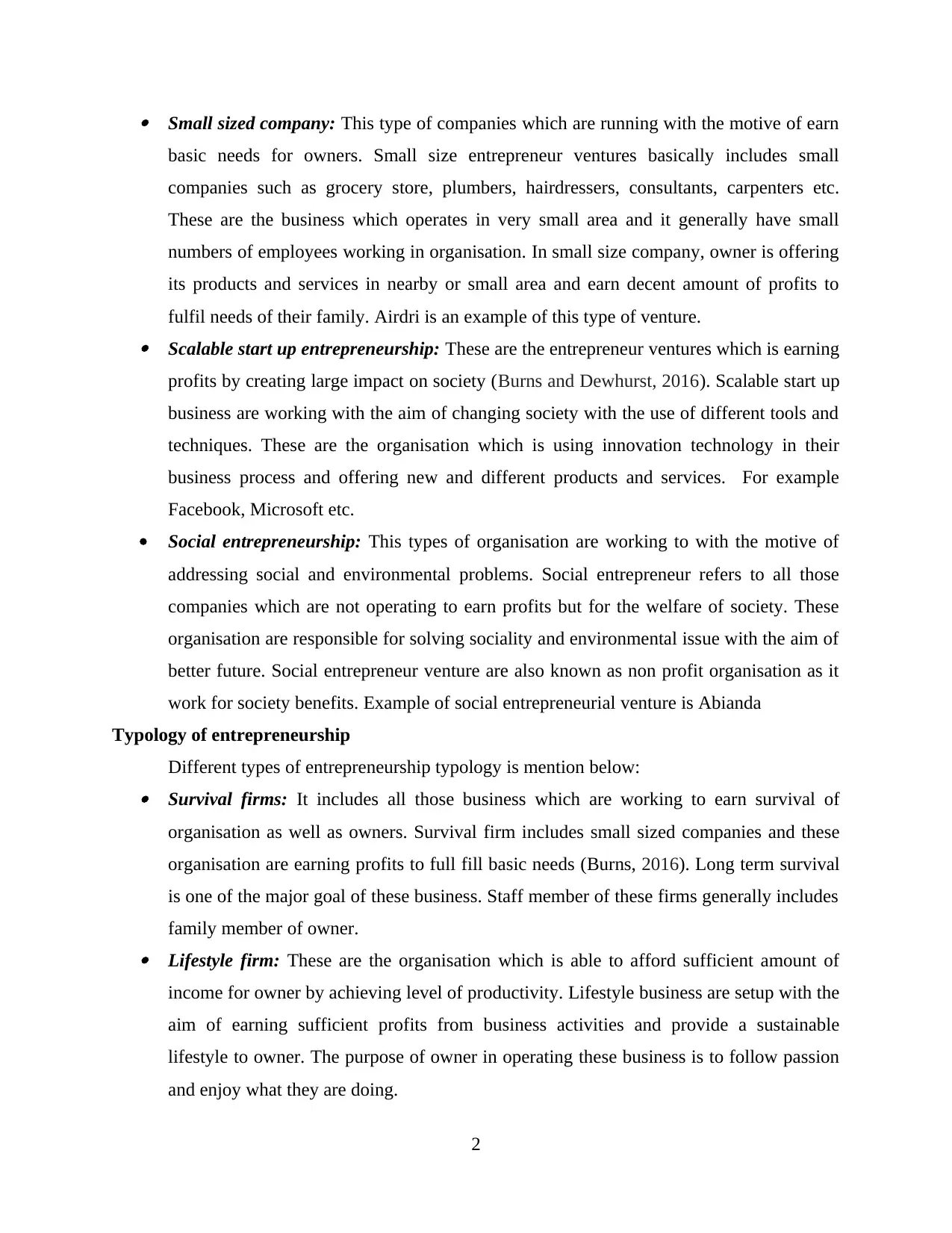
Small sized company: This type of companies which are running with the motive of earn
basic needs for owners. Small size entrepreneur ventures basically includes small
companies such as grocery store, plumbers, hairdressers, consultants, carpenters etc.
These are the business which operates in very small area and it generally have small
numbers of employees working in organisation. In small size company, owner is offering
its products and services in nearby or small area and earn decent amount of profits to
fulfil needs of their family. Airdri is an example of this type of venture. Scalable start up entrepreneurship: These are the entrepreneur ventures which is earning
profits by creating large impact on society (Burns and Dewhurst, 2016). Scalable start up
business are working with the aim of changing society with the use of different tools and
techniques. These are the organisation which is using innovation technology in their
business process and offering new and different products and services. For example
Facebook, Microsoft etc.
Social entrepreneurship: This types of organisation are working to with the motive of
addressing social and environmental problems. Social entrepreneur refers to all those
companies which are not operating to earn profits but for the welfare of society. These
organisation are responsible for solving sociality and environmental issue with the aim of
better future. Social entrepreneur venture are also known as non profit organisation as it
work for society benefits. Example of social entrepreneurial venture is Abianda
Typology of entrepreneurship
Different types of entrepreneurship typology is mention below: Survival firms: It includes all those business which are working to earn survival of
organisation as well as owners. Survival firm includes small sized companies and these
organisation are earning profits to full fill basic needs (Burns, 2016). Long term survival
is one of the major goal of these business. Staff member of these firms generally includes
family member of owner. Lifestyle firm: These are the organisation which is able to afford sufficient amount of
income for owner by achieving level of productivity. Lifestyle business are setup with the
aim of earning sufficient profits from business activities and provide a sustainable
lifestyle to owner. The purpose of owner in operating these business is to follow passion
and enjoy what they are doing.
2
basic needs for owners. Small size entrepreneur ventures basically includes small
companies such as grocery store, plumbers, hairdressers, consultants, carpenters etc.
These are the business which operates in very small area and it generally have small
numbers of employees working in organisation. In small size company, owner is offering
its products and services in nearby or small area and earn decent amount of profits to
fulfil needs of their family. Airdri is an example of this type of venture. Scalable start up entrepreneurship: These are the entrepreneur ventures which is earning
profits by creating large impact on society (Burns and Dewhurst, 2016). Scalable start up
business are working with the aim of changing society with the use of different tools and
techniques. These are the organisation which is using innovation technology in their
business process and offering new and different products and services. For example
Facebook, Microsoft etc.
Social entrepreneurship: This types of organisation are working to with the motive of
addressing social and environmental problems. Social entrepreneur refers to all those
companies which are not operating to earn profits but for the welfare of society. These
organisation are responsible for solving sociality and environmental issue with the aim of
better future. Social entrepreneur venture are also known as non profit organisation as it
work for society benefits. Example of social entrepreneurial venture is Abianda
Typology of entrepreneurship
Different types of entrepreneurship typology is mention below: Survival firms: It includes all those business which are working to earn survival of
organisation as well as owners. Survival firm includes small sized companies and these
organisation are earning profits to full fill basic needs (Burns, 2016). Long term survival
is one of the major goal of these business. Staff member of these firms generally includes
family member of owner. Lifestyle firm: These are the organisation which is able to afford sufficient amount of
income for owner by achieving level of productivity. Lifestyle business are setup with the
aim of earning sufficient profits from business activities and provide a sustainable
lifestyle to owner. The purpose of owner in operating these business is to follow passion
and enjoy what they are doing.
2
Secure Best Marks with AI Grader
Need help grading? Try our AI Grader for instant feedback on your assignments.
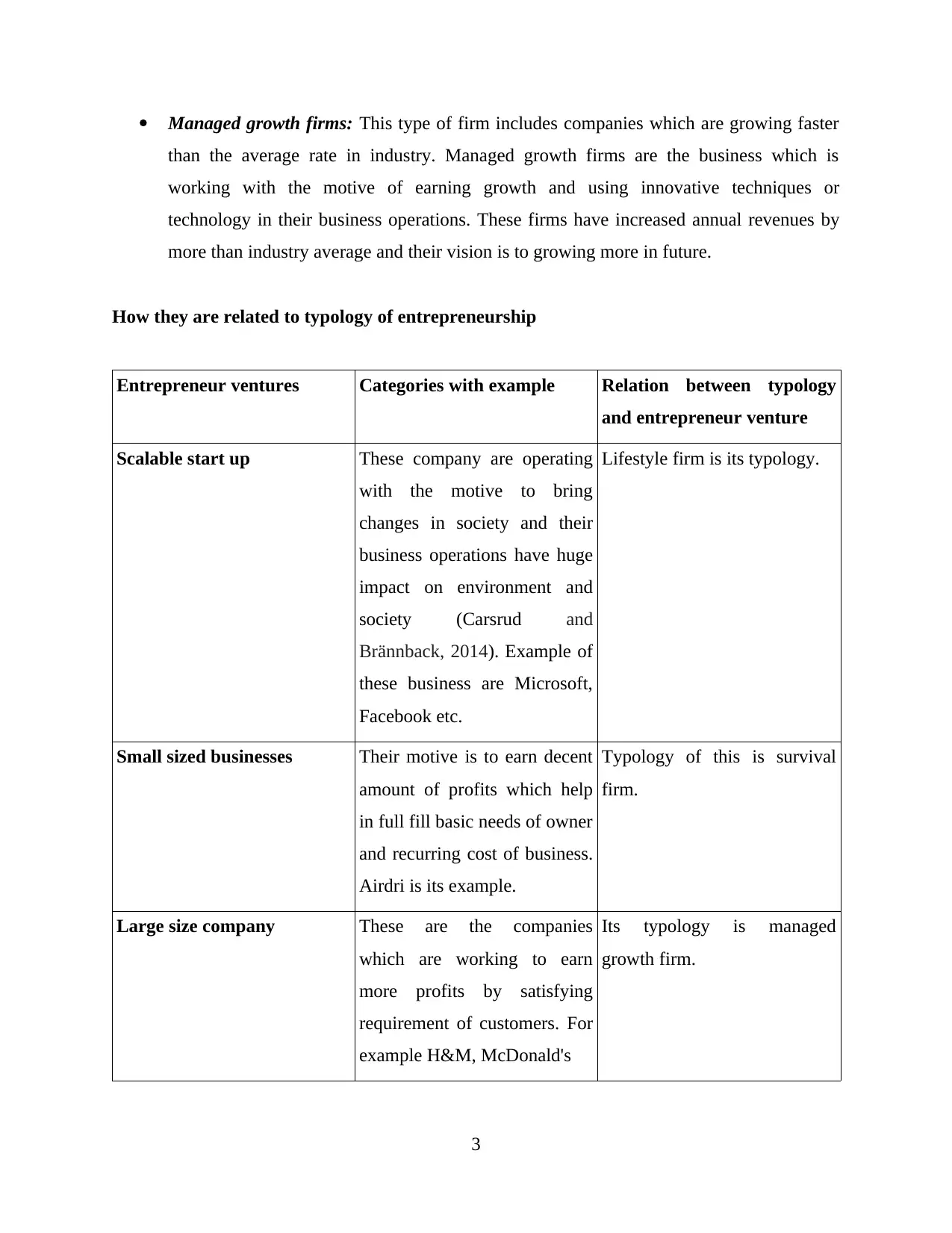
Managed growth firms: This type of firm includes companies which are growing faster
than the average rate in industry. Managed growth firms are the business which is
working with the motive of earning growth and using innovative techniques or
technology in their business operations. These firms have increased annual revenues by
more than industry average and their vision is to growing more in future.
How they are related to typology of entrepreneurship
Entrepreneur ventures Categories with example Relation between typology
and entrepreneur venture
Scalable start up These company are operating
with the motive to bring
changes in society and their
business operations have huge
impact on environment and
society (Carsrud and
Brännback, 2014). Example of
these business are Microsoft,
Facebook etc.
Lifestyle firm is its typology.
Small sized businesses Their motive is to earn decent
amount of profits which help
in full fill basic needs of owner
and recurring cost of business.
Airdri is its example.
Typology of this is survival
firm.
Large size company These are the companies
which are working to earn
more profits by satisfying
requirement of customers. For
example H&M, McDonald's
Its typology is managed
growth firm.
3
than the average rate in industry. Managed growth firms are the business which is
working with the motive of earning growth and using innovative techniques or
technology in their business operations. These firms have increased annual revenues by
more than industry average and their vision is to growing more in future.
How they are related to typology of entrepreneurship
Entrepreneur ventures Categories with example Relation between typology
and entrepreneur venture
Scalable start up These company are operating
with the motive to bring
changes in society and their
business operations have huge
impact on environment and
society (Carsrud and
Brännback, 2014). Example of
these business are Microsoft,
Facebook etc.
Lifestyle firm is its typology.
Small sized businesses Their motive is to earn decent
amount of profits which help
in full fill basic needs of owner
and recurring cost of business.
Airdri is its example.
Typology of this is survival
firm.
Large size company These are the companies
which are working to earn
more profits by satisfying
requirement of customers. For
example H&M, McDonald's
Its typology is managed
growth firm.
3
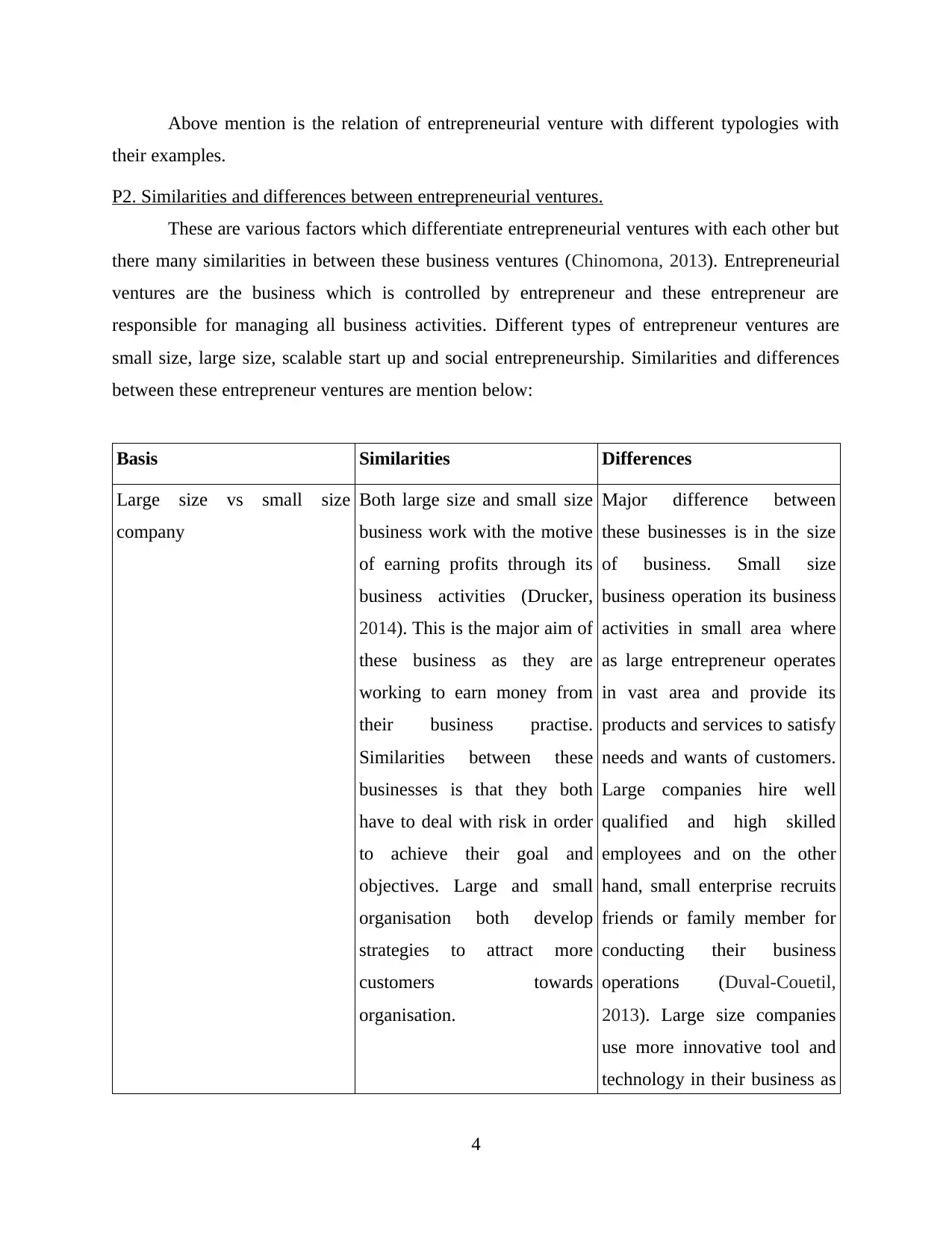
Above mention is the relation of entrepreneurial venture with different typologies with
their examples.
P2. Similarities and differences between entrepreneurial ventures.
These are various factors which differentiate entrepreneurial ventures with each other but
there many similarities in between these business ventures (Chinomona, 2013). Entrepreneurial
ventures are the business which is controlled by entrepreneur and these entrepreneur are
responsible for managing all business activities. Different types of entrepreneur ventures are
small size, large size, scalable start up and social entrepreneurship. Similarities and differences
between these entrepreneur ventures are mention below:
Basis Similarities Differences
Large size vs small size
company
Both large size and small size
business work with the motive
of earning profits through its
business activities (Drucker,
2014). This is the major aim of
these business as they are
working to earn money from
their business practise.
Similarities between these
businesses is that they both
have to deal with risk in order
to achieve their goal and
objectives. Large and small
organisation both develop
strategies to attract more
customers towards
organisation.
Major difference between
these businesses is in the size
of business. Small size
business operation its business
activities in small area where
as large entrepreneur operates
in vast area and provide its
products and services to satisfy
needs and wants of customers.
Large companies hire well
qualified and high skilled
employees and on the other
hand, small enterprise recruits
friends or family member for
conducting their business
operations (Duval‐Couetil,
2013). Large size companies
use more innovative tool and
technology in their business as
4
their examples.
P2. Similarities and differences between entrepreneurial ventures.
These are various factors which differentiate entrepreneurial ventures with each other but
there many similarities in between these business ventures (Chinomona, 2013). Entrepreneurial
ventures are the business which is controlled by entrepreneur and these entrepreneur are
responsible for managing all business activities. Different types of entrepreneur ventures are
small size, large size, scalable start up and social entrepreneurship. Similarities and differences
between these entrepreneur ventures are mention below:
Basis Similarities Differences
Large size vs small size
company
Both large size and small size
business work with the motive
of earning profits through its
business activities (Drucker,
2014). This is the major aim of
these business as they are
working to earn money from
their business practise.
Similarities between these
businesses is that they both
have to deal with risk in order
to achieve their goal and
objectives. Large and small
organisation both develop
strategies to attract more
customers towards
organisation.
Major difference between
these businesses is in the size
of business. Small size
business operation its business
activities in small area where
as large entrepreneur operates
in vast area and provide its
products and services to satisfy
needs and wants of customers.
Large companies hire well
qualified and high skilled
employees and on the other
hand, small enterprise recruits
friends or family member for
conducting their business
operations (Duval‐Couetil,
2013). Large size companies
use more innovative tool and
technology in their business as
4
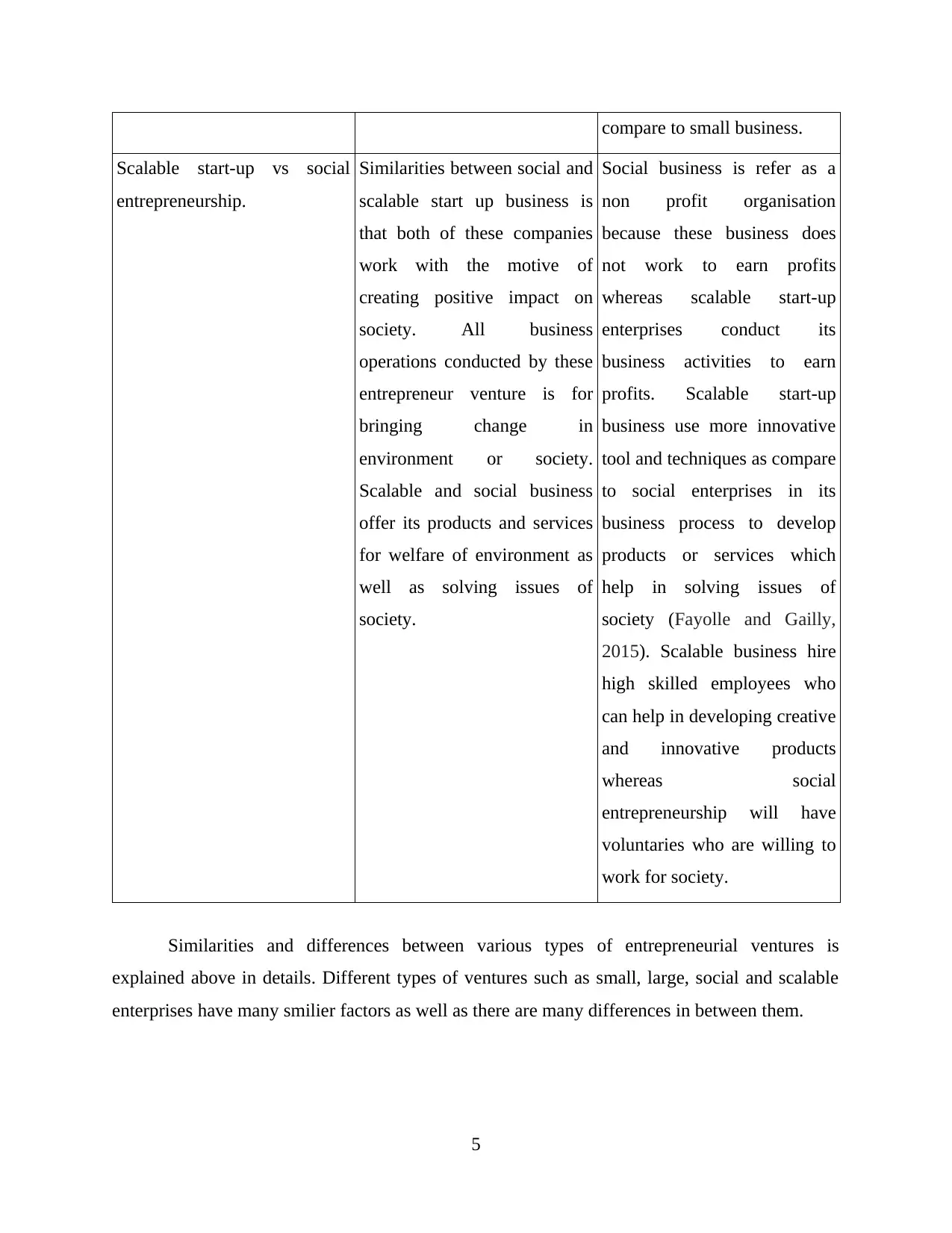
compare to small business.
Scalable start-up vs social
entrepreneurship.
Similarities between social and
scalable start up business is
that both of these companies
work with the motive of
creating positive impact on
society. All business
operations conducted by these
entrepreneur venture is for
bringing change in
environment or society.
Scalable and social business
offer its products and services
for welfare of environment as
well as solving issues of
society.
Social business is refer as a
non profit organisation
because these business does
not work to earn profits
whereas scalable start-up
enterprises conduct its
business activities to earn
profits. Scalable start-up
business use more innovative
tool and techniques as compare
to social enterprises in its
business process to develop
products or services which
help in solving issues of
society (Fayolle and Gailly,
2015). Scalable business hire
high skilled employees who
can help in developing creative
and innovative products
whereas social
entrepreneurship will have
voluntaries who are willing to
work for society.
Similarities and differences between various types of entrepreneurial ventures is
explained above in details. Different types of ventures such as small, large, social and scalable
enterprises have many smilier factors as well as there are many differences in between them.
5
Scalable start-up vs social
entrepreneurship.
Similarities between social and
scalable start up business is
that both of these companies
work with the motive of
creating positive impact on
society. All business
operations conducted by these
entrepreneur venture is for
bringing change in
environment or society.
Scalable and social business
offer its products and services
for welfare of environment as
well as solving issues of
society.
Social business is refer as a
non profit organisation
because these business does
not work to earn profits
whereas scalable start-up
enterprises conduct its
business activities to earn
profits. Scalable start-up
business use more innovative
tool and techniques as compare
to social enterprises in its
business process to develop
products or services which
help in solving issues of
society (Fayolle and Gailly,
2015). Scalable business hire
high skilled employees who
can help in developing creative
and innovative products
whereas social
entrepreneurship will have
voluntaries who are willing to
work for society.
Similarities and differences between various types of entrepreneurial ventures is
explained above in details. Different types of ventures such as small, large, social and scalable
enterprises have many smilier factors as well as there are many differences in between them.
5
Paraphrase This Document
Need a fresh take? Get an instant paraphrase of this document with our AI Paraphraser
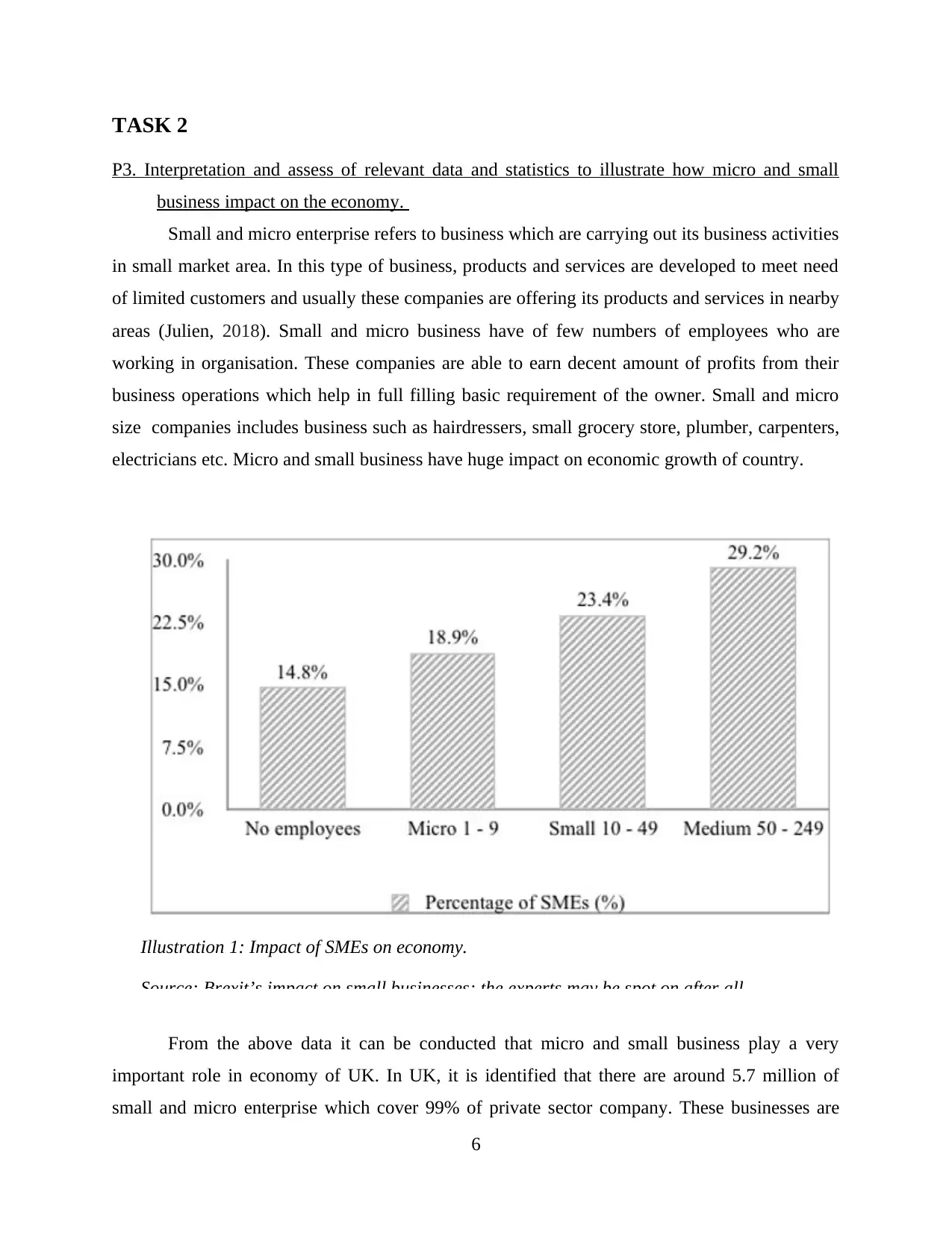
TASK 2
P3. Interpretation and assess of relevant data and statistics to illustrate how micro and small
business impact on the economy.
Small and micro enterprise refers to business which are carrying out its business activities
in small market area. In this type of business, products and services are developed to meet need
of limited customers and usually these companies are offering its products and services in nearby
areas (Julien, 2018). Small and micro business have of few numbers of employees who are
working in organisation. These companies are able to earn decent amount of profits from their
business operations which help in full filling basic requirement of the owner. Small and micro
size companies includes business such as hairdressers, small grocery store, plumber, carpenters,
electricians etc. Micro and small business have huge impact on economic growth of country.
From the above data it can be conducted that micro and small business play a very
important role in economy of UK. In UK, it is identified that there are around 5.7 million of
small and micro enterprise which cover 99% of private sector company. These businesses are
6
Illustration 1: Impact of SMEs on economy.
Source: Brexit’s impact on small businesses: the experts may be spot on after all.
P3. Interpretation and assess of relevant data and statistics to illustrate how micro and small
business impact on the economy.
Small and micro enterprise refers to business which are carrying out its business activities
in small market area. In this type of business, products and services are developed to meet need
of limited customers and usually these companies are offering its products and services in nearby
areas (Julien, 2018). Small and micro business have of few numbers of employees who are
working in organisation. These companies are able to earn decent amount of profits from their
business operations which help in full filling basic requirement of the owner. Small and micro
size companies includes business such as hairdressers, small grocery store, plumber, carpenters,
electricians etc. Micro and small business have huge impact on economic growth of country.
From the above data it can be conducted that micro and small business play a very
important role in economy of UK. In UK, it is identified that there are around 5.7 million of
small and micro enterprise which cover 99% of private sector company. These businesses are
6
Illustration 1: Impact of SMEs on economy.
Source: Brexit’s impact on small businesses: the experts may be spot on after all.
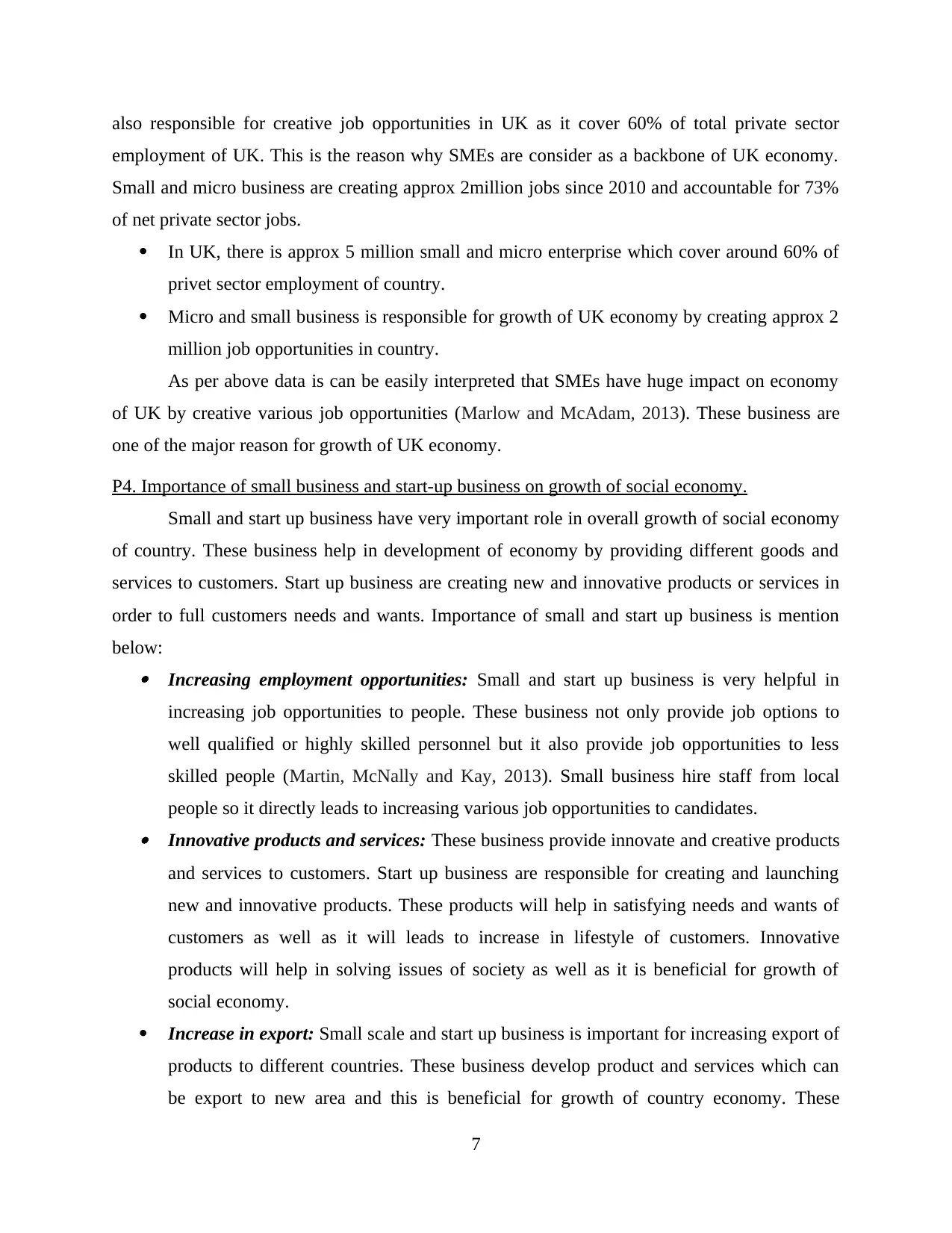
also responsible for creative job opportunities in UK as it cover 60% of total private sector
employment of UK. This is the reason why SMEs are consider as a backbone of UK economy.
Small and micro business are creating approx 2million jobs since 2010 and accountable for 73%
of net private sector jobs.
In UK, there is approx 5 million small and micro enterprise which cover around 60% of
privet sector employment of country.
Micro and small business is responsible for growth of UK economy by creating approx 2
million job opportunities in country.
As per above data is can be easily interpreted that SMEs have huge impact on economy
of UK by creative various job opportunities (Marlow and McAdam, 2013). These business are
one of the major reason for growth of UK economy.
P4. Importance of small business and start-up business on growth of social economy.
Small and start up business have very important role in overall growth of social economy
of country. These business help in development of economy by providing different goods and
services to customers. Start up business are creating new and innovative products or services in
order to full customers needs and wants. Importance of small and start up business is mention
below: Increasing employment opportunities: Small and start up business is very helpful in
increasing job opportunities to people. These business not only provide job options to
well qualified or highly skilled personnel but it also provide job opportunities to less
skilled people (Martin, McNally and Kay, 2013). Small business hire staff from local
people so it directly leads to increasing various job opportunities to candidates. Innovative products and services: These business provide innovate and creative products
and services to customers. Start up business are responsible for creating and launching
new and innovative products. These products will help in satisfying needs and wants of
customers as well as it will leads to increase in lifestyle of customers. Innovative
products will help in solving issues of society as well as it is beneficial for growth of
social economy.
Increase in export: Small scale and start up business is important for increasing export of
products to different countries. These business develop product and services which can
be export to new area and this is beneficial for growth of country economy. These
7
employment of UK. This is the reason why SMEs are consider as a backbone of UK economy.
Small and micro business are creating approx 2million jobs since 2010 and accountable for 73%
of net private sector jobs.
In UK, there is approx 5 million small and micro enterprise which cover around 60% of
privet sector employment of country.
Micro and small business is responsible for growth of UK economy by creating approx 2
million job opportunities in country.
As per above data is can be easily interpreted that SMEs have huge impact on economy
of UK by creative various job opportunities (Marlow and McAdam, 2013). These business are
one of the major reason for growth of UK economy.
P4. Importance of small business and start-up business on growth of social economy.
Small and start up business have very important role in overall growth of social economy
of country. These business help in development of economy by providing different goods and
services to customers. Start up business are creating new and innovative products or services in
order to full customers needs and wants. Importance of small and start up business is mention
below: Increasing employment opportunities: Small and start up business is very helpful in
increasing job opportunities to people. These business not only provide job options to
well qualified or highly skilled personnel but it also provide job opportunities to less
skilled people (Martin, McNally and Kay, 2013). Small business hire staff from local
people so it directly leads to increasing various job opportunities to candidates. Innovative products and services: These business provide innovate and creative products
and services to customers. Start up business are responsible for creating and launching
new and innovative products. These products will help in satisfying needs and wants of
customers as well as it will leads to increase in lifestyle of customers. Innovative
products will help in solving issues of society as well as it is beneficial for growth of
social economy.
Increase in export: Small scale and start up business is important for increasing export of
products to different countries. These business develop product and services which can
be export to new area and this is beneficial for growth of country economy. These
7
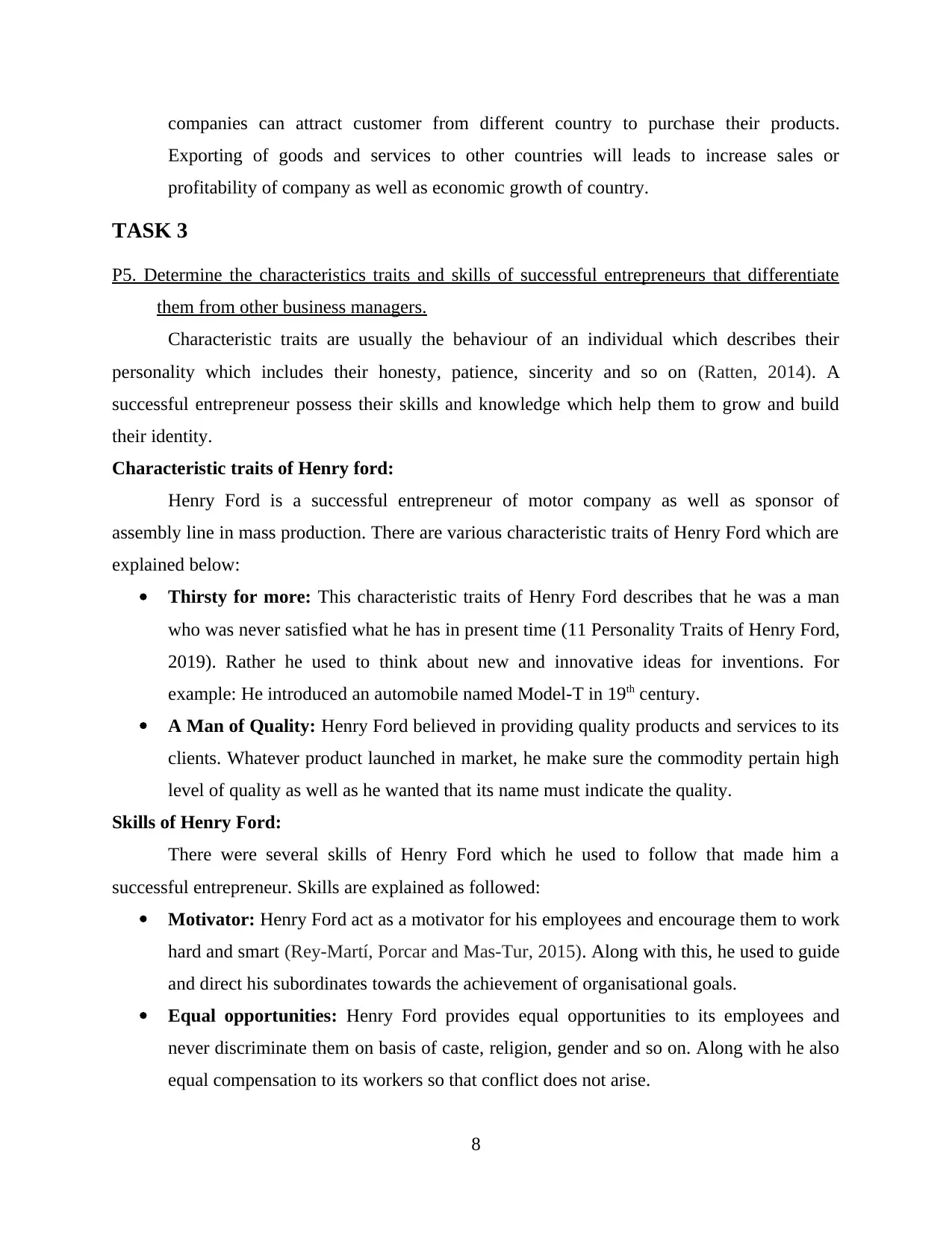
companies can attract customer from different country to purchase their products.
Exporting of goods and services to other countries will leads to increase sales or
profitability of company as well as economic growth of country.
TASK 3
P5. Determine the characteristics traits and skills of successful entrepreneurs that differentiate
them from other business managers.
Characteristic traits are usually the behaviour of an individual which describes their
personality which includes their honesty, patience, sincerity and so on (Ratten, 2014). A
successful entrepreneur possess their skills and knowledge which help them to grow and build
their identity.
Characteristic traits of Henry ford:
Henry Ford is a successful entrepreneur of motor company as well as sponsor of
assembly line in mass production. There are various characteristic traits of Henry Ford which are
explained below:
Thirsty for more: This characteristic traits of Henry Ford describes that he was a man
who was never satisfied what he has in present time (11 Personality Traits of Henry Ford,
2019). Rather he used to think about new and innovative ideas for inventions. For
example: He introduced an automobile named Model-T in 19th century.
A Man of Quality: Henry Ford believed in providing quality products and services to its
clients. Whatever product launched in market, he make sure the commodity pertain high
level of quality as well as he wanted that its name must indicate the quality.
Skills of Henry Ford:
There were several skills of Henry Ford which he used to follow that made him a
successful entrepreneur. Skills are explained as followed:
Motivator: Henry Ford act as a motivator for his employees and encourage them to work
hard and smart (Rey-Martí, Porcar and Mas-Tur, 2015). Along with this, he used to guide
and direct his subordinates towards the achievement of organisational goals.
Equal opportunities: Henry Ford provides equal opportunities to its employees and
never discriminate them on basis of caste, religion, gender and so on. Along with he also
equal compensation to its workers so that conflict does not arise.
8
Exporting of goods and services to other countries will leads to increase sales or
profitability of company as well as economic growth of country.
TASK 3
P5. Determine the characteristics traits and skills of successful entrepreneurs that differentiate
them from other business managers.
Characteristic traits are usually the behaviour of an individual which describes their
personality which includes their honesty, patience, sincerity and so on (Ratten, 2014). A
successful entrepreneur possess their skills and knowledge which help them to grow and build
their identity.
Characteristic traits of Henry ford:
Henry Ford is a successful entrepreneur of motor company as well as sponsor of
assembly line in mass production. There are various characteristic traits of Henry Ford which are
explained below:
Thirsty for more: This characteristic traits of Henry Ford describes that he was a man
who was never satisfied what he has in present time (11 Personality Traits of Henry Ford,
2019). Rather he used to think about new and innovative ideas for inventions. For
example: He introduced an automobile named Model-T in 19th century.
A Man of Quality: Henry Ford believed in providing quality products and services to its
clients. Whatever product launched in market, he make sure the commodity pertain high
level of quality as well as he wanted that its name must indicate the quality.
Skills of Henry Ford:
There were several skills of Henry Ford which he used to follow that made him a
successful entrepreneur. Skills are explained as followed:
Motivator: Henry Ford act as a motivator for his employees and encourage them to work
hard and smart (Rey-Martí, Porcar and Mas-Tur, 2015). Along with this, he used to guide
and direct his subordinates towards the achievement of organisational goals.
Equal opportunities: Henry Ford provides equal opportunities to its employees and
never discriminate them on basis of caste, religion, gender and so on. Along with he also
equal compensation to its workers so that conflict does not arise.
8
Secure Best Marks with AI Grader
Need help grading? Try our AI Grader for instant feedback on your assignments.
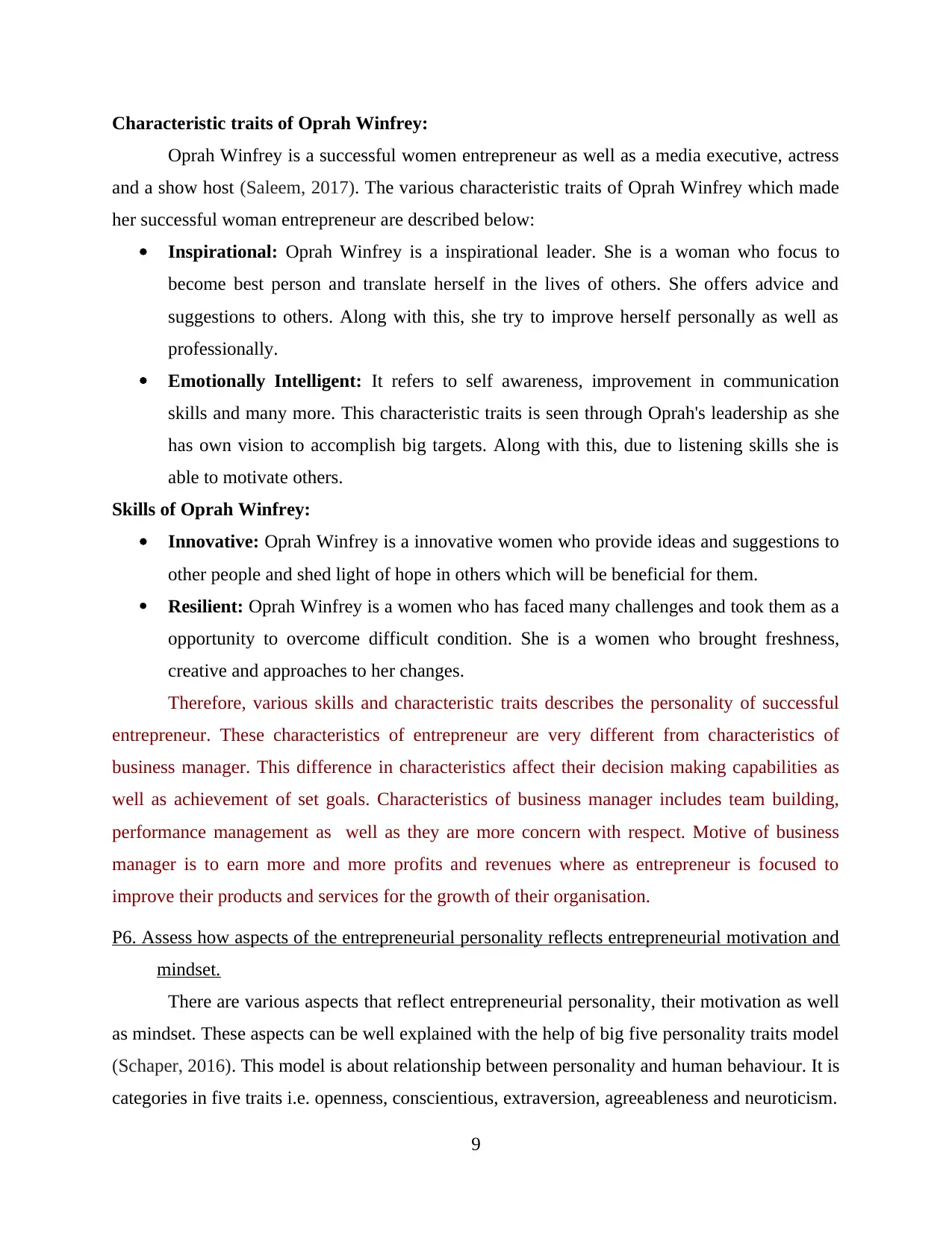
Characteristic traits of Oprah Winfrey:
Oprah Winfrey is a successful women entrepreneur as well as a media executive, actress
and a show host (Saleem, 2017). The various characteristic traits of Oprah Winfrey which made
her successful woman entrepreneur are described below:
Inspirational: Oprah Winfrey is a inspirational leader. She is a woman who focus to
become best person and translate herself in the lives of others. She offers advice and
suggestions to others. Along with this, she try to improve herself personally as well as
professionally.
Emotionally Intelligent: It refers to self awareness, improvement in communication
skills and many more. This characteristic traits is seen through Oprah's leadership as she
has own vision to accomplish big targets. Along with this, due to listening skills she is
able to motivate others.
Skills of Oprah Winfrey:
Innovative: Oprah Winfrey is a innovative women who provide ideas and suggestions to
other people and shed light of hope in others which will be beneficial for them.
Resilient: Oprah Winfrey is a women who has faced many challenges and took them as a
opportunity to overcome difficult condition. She is a women who brought freshness,
creative and approaches to her changes.
Therefore, various skills and characteristic traits describes the personality of successful
entrepreneur. These characteristics of entrepreneur are very different from characteristics of
business manager. This difference in characteristics affect their decision making capabilities as
well as achievement of set goals. Characteristics of business manager includes team building,
performance management as well as they are more concern with respect. Motive of business
manager is to earn more and more profits and revenues where as entrepreneur is focused to
improve their products and services for the growth of their organisation.
P6. Assess how aspects of the entrepreneurial personality reflects entrepreneurial motivation and
mindset.
There are various aspects that reflect entrepreneurial personality, their motivation as well
as mindset. These aspects can be well explained with the help of big five personality traits model
(Schaper, 2016). This model is about relationship between personality and human behaviour. It is
categories in five traits i.e. openness, conscientious, extraversion, agreeableness and neuroticism.
9
Oprah Winfrey is a successful women entrepreneur as well as a media executive, actress
and a show host (Saleem, 2017). The various characteristic traits of Oprah Winfrey which made
her successful woman entrepreneur are described below:
Inspirational: Oprah Winfrey is a inspirational leader. She is a woman who focus to
become best person and translate herself in the lives of others. She offers advice and
suggestions to others. Along with this, she try to improve herself personally as well as
professionally.
Emotionally Intelligent: It refers to self awareness, improvement in communication
skills and many more. This characteristic traits is seen through Oprah's leadership as she
has own vision to accomplish big targets. Along with this, due to listening skills she is
able to motivate others.
Skills of Oprah Winfrey:
Innovative: Oprah Winfrey is a innovative women who provide ideas and suggestions to
other people and shed light of hope in others which will be beneficial for them.
Resilient: Oprah Winfrey is a women who has faced many challenges and took them as a
opportunity to overcome difficult condition. She is a women who brought freshness,
creative and approaches to her changes.
Therefore, various skills and characteristic traits describes the personality of successful
entrepreneur. These characteristics of entrepreneur are very different from characteristics of
business manager. This difference in characteristics affect their decision making capabilities as
well as achievement of set goals. Characteristics of business manager includes team building,
performance management as well as they are more concern with respect. Motive of business
manager is to earn more and more profits and revenues where as entrepreneur is focused to
improve their products and services for the growth of their organisation.
P6. Assess how aspects of the entrepreneurial personality reflects entrepreneurial motivation and
mindset.
There are various aspects that reflect entrepreneurial personality, their motivation as well
as mindset. These aspects can be well explained with the help of big five personality traits model
(Schaper, 2016). This model is about relationship between personality and human behaviour. It is
categories in five traits i.e. openness, conscientious, extraversion, agreeableness and neuroticism.
9
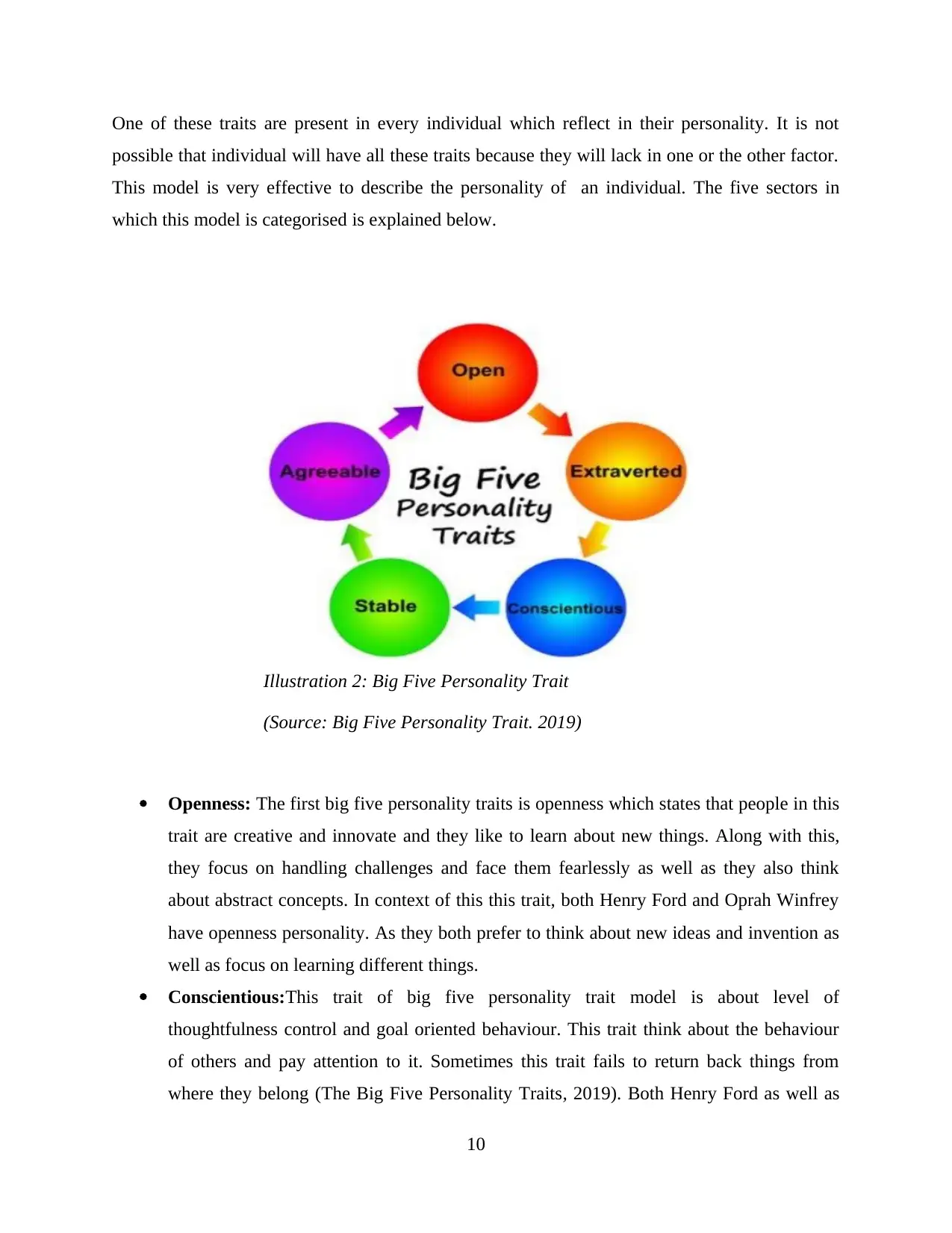
One of these traits are present in every individual which reflect in their personality. It is not
possible that individual will have all these traits because they will lack in one or the other factor.
This model is very effective to describe the personality of an individual. The five sectors in
which this model is categorised is explained below.
Openness: The first big five personality traits is openness which states that people in this
trait are creative and innovate and they like to learn about new things. Along with this,
they focus on handling challenges and face them fearlessly as well as they also think
about abstract concepts. In context of this this trait, both Henry Ford and Oprah Winfrey
have openness personality. As they both prefer to think about new ideas and invention as
well as focus on learning different things.
Conscientious:This trait of big five personality trait model is about level of
thoughtfulness control and goal oriented behaviour. This trait think about the behaviour
of others and pay attention to it. Sometimes this trait fails to return back things from
where they belong (The Big Five Personality Traits, 2019). Both Henry Ford as well as
10
Illustration 2: Big Five Personality Trait
(Source: Big Five Personality Trait. 2019)
possible that individual will have all these traits because they will lack in one or the other factor.
This model is very effective to describe the personality of an individual. The five sectors in
which this model is categorised is explained below.
Openness: The first big five personality traits is openness which states that people in this
trait are creative and innovate and they like to learn about new things. Along with this,
they focus on handling challenges and face them fearlessly as well as they also think
about abstract concepts. In context of this this trait, both Henry Ford and Oprah Winfrey
have openness personality. As they both prefer to think about new ideas and invention as
well as focus on learning different things.
Conscientious:This trait of big five personality trait model is about level of
thoughtfulness control and goal oriented behaviour. This trait think about the behaviour
of others and pay attention to it. Sometimes this trait fails to return back things from
where they belong (The Big Five Personality Traits, 2019). Both Henry Ford as well as
10
Illustration 2: Big Five Personality Trait
(Source: Big Five Personality Trait. 2019)
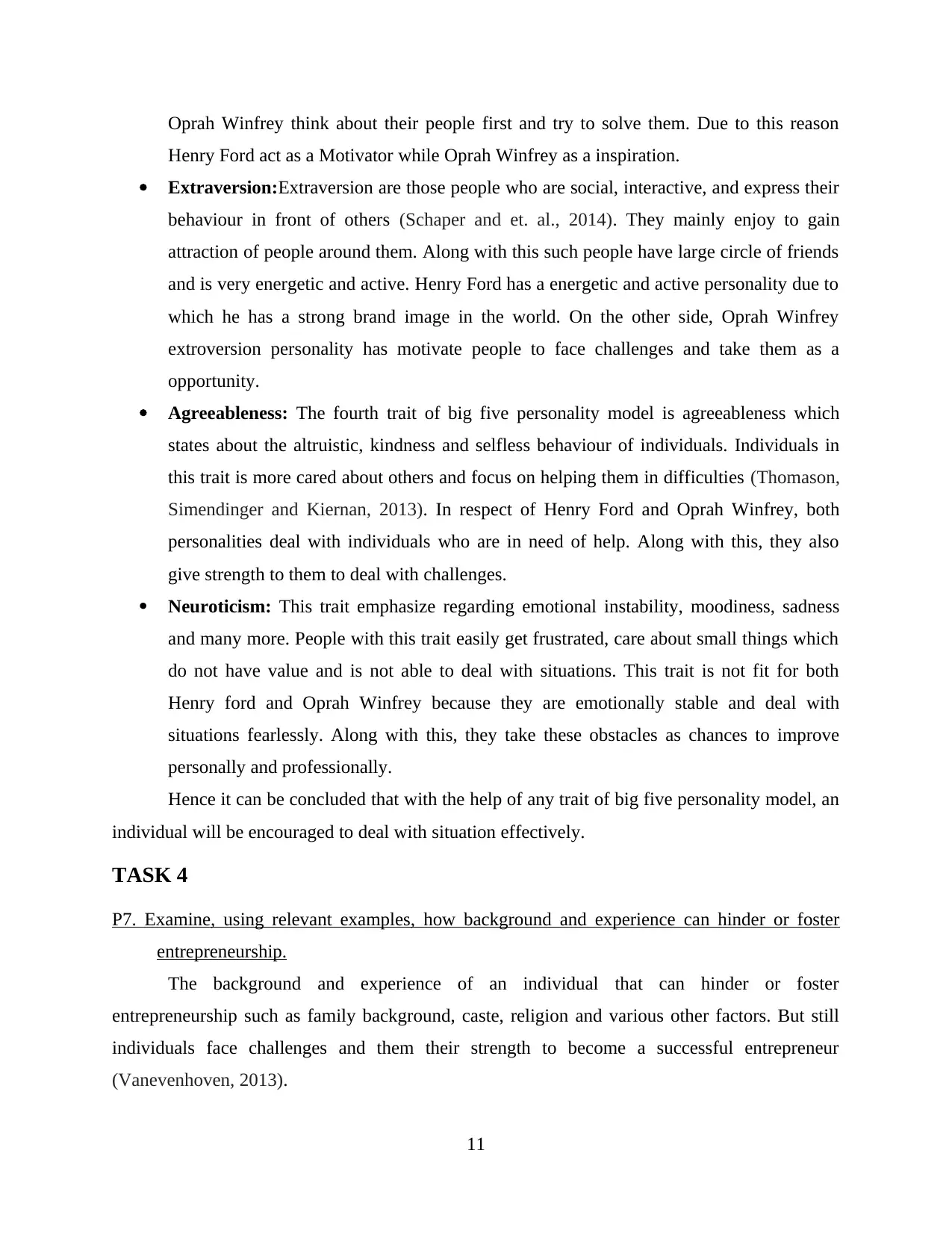
Oprah Winfrey think about their people first and try to solve them. Due to this reason
Henry Ford act as a Motivator while Oprah Winfrey as a inspiration.
Extraversion:Extraversion are those people who are social, interactive, and express their
behaviour in front of others (Schaper and et. al., 2014). They mainly enjoy to gain
attraction of people around them. Along with this such people have large circle of friends
and is very energetic and active. Henry Ford has a energetic and active personality due to
which he has a strong brand image in the world. On the other side, Oprah Winfrey
extroversion personality has motivate people to face challenges and take them as a
opportunity.
Agreeableness: The fourth trait of big five personality model is agreeableness which
states about the altruistic, kindness and selfless behaviour of individuals. Individuals in
this trait is more cared about others and focus on helping them in difficulties (Thomason,
Simendinger and Kiernan, 2013). In respect of Henry Ford and Oprah Winfrey, both
personalities deal with individuals who are in need of help. Along with this, they also
give strength to them to deal with challenges.
Neuroticism: This trait emphasize regarding emotional instability, moodiness, sadness
and many more. People with this trait easily get frustrated, care about small things which
do not have value and is not able to deal with situations. This trait is not fit for both
Henry ford and Oprah Winfrey because they are emotionally stable and deal with
situations fearlessly. Along with this, they take these obstacles as chances to improve
personally and professionally.
Hence it can be concluded that with the help of any trait of big five personality model, an
individual will be encouraged to deal with situation effectively.
TASK 4
P7. Examine, using relevant examples, how background and experience can hinder or foster
entrepreneurship.
The background and experience of an individual that can hinder or foster
entrepreneurship such as family background, caste, religion and various other factors. But still
individuals face challenges and them their strength to become a successful entrepreneur
(Vanevenhoven, 2013).
11
Henry Ford act as a Motivator while Oprah Winfrey as a inspiration.
Extraversion:Extraversion are those people who are social, interactive, and express their
behaviour in front of others (Schaper and et. al., 2014). They mainly enjoy to gain
attraction of people around them. Along with this such people have large circle of friends
and is very energetic and active. Henry Ford has a energetic and active personality due to
which he has a strong brand image in the world. On the other side, Oprah Winfrey
extroversion personality has motivate people to face challenges and take them as a
opportunity.
Agreeableness: The fourth trait of big five personality model is agreeableness which
states about the altruistic, kindness and selfless behaviour of individuals. Individuals in
this trait is more cared about others and focus on helping them in difficulties (Thomason,
Simendinger and Kiernan, 2013). In respect of Henry Ford and Oprah Winfrey, both
personalities deal with individuals who are in need of help. Along with this, they also
give strength to them to deal with challenges.
Neuroticism: This trait emphasize regarding emotional instability, moodiness, sadness
and many more. People with this trait easily get frustrated, care about small things which
do not have value and is not able to deal with situations. This trait is not fit for both
Henry ford and Oprah Winfrey because they are emotionally stable and deal with
situations fearlessly. Along with this, they take these obstacles as chances to improve
personally and professionally.
Hence it can be concluded that with the help of any trait of big five personality model, an
individual will be encouraged to deal with situation effectively.
TASK 4
P7. Examine, using relevant examples, how background and experience can hinder or foster
entrepreneurship.
The background and experience of an individual that can hinder or foster
entrepreneurship such as family background, caste, religion and various other factors. But still
individuals face challenges and them their strength to become a successful entrepreneur
(Vanevenhoven, 2013).
11
Paraphrase This Document
Need a fresh take? Get an instant paraphrase of this document with our AI Paraphraser
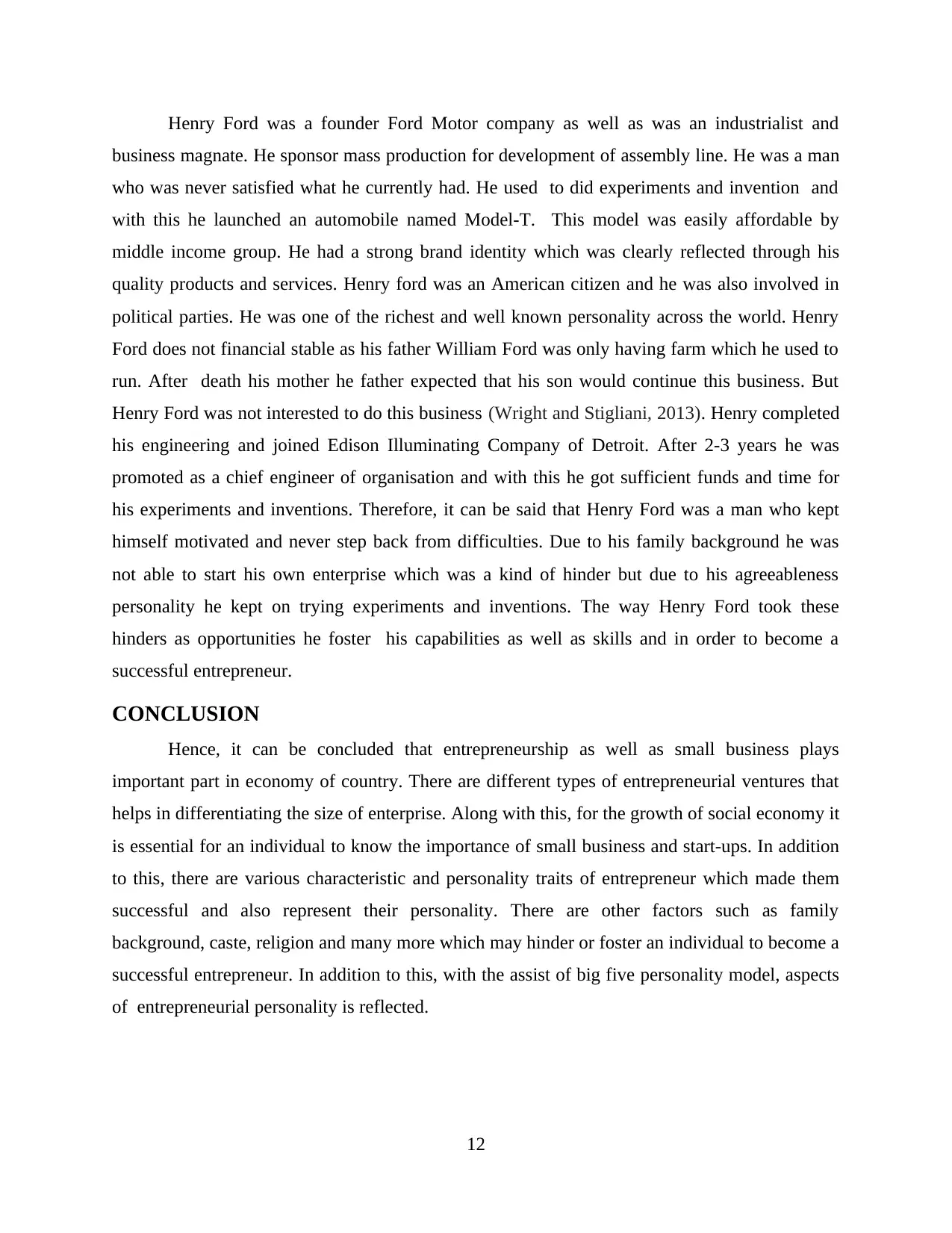
Henry Ford was a founder Ford Motor company as well as was an industrialist and
business magnate. He sponsor mass production for development of assembly line. He was a man
who was never satisfied what he currently had. He used to did experiments and invention and
with this he launched an automobile named Model-T. This model was easily affordable by
middle income group. He had a strong brand identity which was clearly reflected through his
quality products and services. Henry ford was an American citizen and he was also involved in
political parties. He was one of the richest and well known personality across the world. Henry
Ford does not financial stable as his father William Ford was only having farm which he used to
run. After death his mother he father expected that his son would continue this business. But
Henry Ford was not interested to do this business (Wright and Stigliani, 2013). Henry completed
his engineering and joined Edison Illuminating Company of Detroit. After 2-3 years he was
promoted as a chief engineer of organisation and with this he got sufficient funds and time for
his experiments and inventions. Therefore, it can be said that Henry Ford was a man who kept
himself motivated and never step back from difficulties. Due to his family background he was
not able to start his own enterprise which was a kind of hinder but due to his agreeableness
personality he kept on trying experiments and inventions. The way Henry Ford took these
hinders as opportunities he foster his capabilities as well as skills and in order to become a
successful entrepreneur.
CONCLUSION
Hence, it can be concluded that entrepreneurship as well as small business plays
important part in economy of country. There are different types of entrepreneurial ventures that
helps in differentiating the size of enterprise. Along with this, for the growth of social economy it
is essential for an individual to know the importance of small business and start-ups. In addition
to this, there are various characteristic and personality traits of entrepreneur which made them
successful and also represent their personality. There are other factors such as family
background, caste, religion and many more which may hinder or foster an individual to become a
successful entrepreneur. In addition to this, with the assist of big five personality model, aspects
of entrepreneurial personality is reflected.
12
business magnate. He sponsor mass production for development of assembly line. He was a man
who was never satisfied what he currently had. He used to did experiments and invention and
with this he launched an automobile named Model-T. This model was easily affordable by
middle income group. He had a strong brand identity which was clearly reflected through his
quality products and services. Henry ford was an American citizen and he was also involved in
political parties. He was one of the richest and well known personality across the world. Henry
Ford does not financial stable as his father William Ford was only having farm which he used to
run. After death his mother he father expected that his son would continue this business. But
Henry Ford was not interested to do this business (Wright and Stigliani, 2013). Henry completed
his engineering and joined Edison Illuminating Company of Detroit. After 2-3 years he was
promoted as a chief engineer of organisation and with this he got sufficient funds and time for
his experiments and inventions. Therefore, it can be said that Henry Ford was a man who kept
himself motivated and never step back from difficulties. Due to his family background he was
not able to start his own enterprise which was a kind of hinder but due to his agreeableness
personality he kept on trying experiments and inventions. The way Henry Ford took these
hinders as opportunities he foster his capabilities as well as skills and in order to become a
successful entrepreneur.
CONCLUSION
Hence, it can be concluded that entrepreneurship as well as small business plays
important part in economy of country. There are different types of entrepreneurial ventures that
helps in differentiating the size of enterprise. Along with this, for the growth of social economy it
is essential for an individual to know the importance of small business and start-ups. In addition
to this, there are various characteristic and personality traits of entrepreneur which made them
successful and also represent their personality. There are other factors such as family
background, caste, religion and many more which may hinder or foster an individual to become a
successful entrepreneur. In addition to this, with the assist of big five personality model, aspects
of entrepreneurial personality is reflected.
12

13
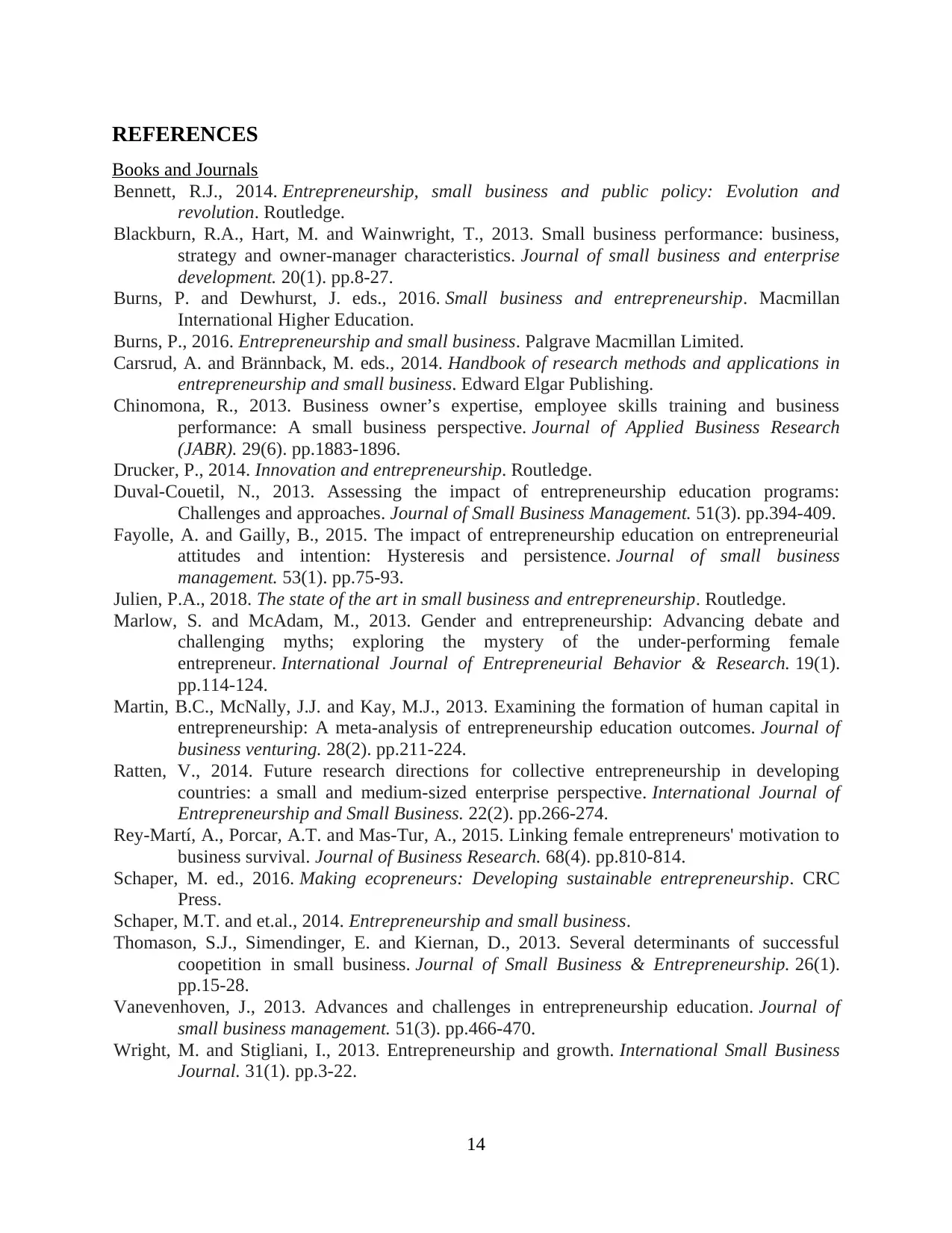
REFERENCES
Books and Journals
Bennett, R.J., 2014. Entrepreneurship, small business and public policy: Evolution and
revolution. Routledge.
Blackburn, R.A., Hart, M. and Wainwright, T., 2013. Small business performance: business,
strategy and owner-manager characteristics. Journal of small business and enterprise
development. 20(1). pp.8-27.
Burns, P. and Dewhurst, J. eds., 2016. Small business and entrepreneurship. Macmillan
International Higher Education.
Burns, P., 2016. Entrepreneurship and small business. Palgrave Macmillan Limited.
Carsrud, A. and Brännback, M. eds., 2014. Handbook of research methods and applications in
entrepreneurship and small business. Edward Elgar Publishing.
Chinomona, R., 2013. Business owner’s expertise, employee skills training and business
performance: A small business perspective. Journal of Applied Business Research
(JABR). 29(6). pp.1883-1896.
Drucker, P., 2014. Innovation and entrepreneurship. Routledge.
Duval‐Couetil, N., 2013. Assessing the impact of entrepreneurship education programs:
Challenges and approaches. Journal of Small Business Management. 51(3). pp.394-409.
Fayolle, A. and Gailly, B., 2015. The impact of entrepreneurship education on entrepreneurial
attitudes and intention: Hysteresis and persistence. Journal of small business
management. 53(1). pp.75-93.
Julien, P.A., 2018. The state of the art in small business and entrepreneurship. Routledge.
Marlow, S. and McAdam, M., 2013. Gender and entrepreneurship: Advancing debate and
challenging myths; exploring the mystery of the under-performing female
entrepreneur. International Journal of Entrepreneurial Behavior & Research. 19(1).
pp.114-124.
Martin, B.C., McNally, J.J. and Kay, M.J., 2013. Examining the formation of human capital in
entrepreneurship: A meta-analysis of entrepreneurship education outcomes. Journal of
business venturing. 28(2). pp.211-224.
Ratten, V., 2014. Future research directions for collective entrepreneurship in developing
countries: a small and medium-sized enterprise perspective. International Journal of
Entrepreneurship and Small Business. 22(2). pp.266-274.
Rey-Martí, A., Porcar, A.T. and Mas-Tur, A., 2015. Linking female entrepreneurs' motivation to
business survival. Journal of Business Research. 68(4). pp.810-814.
Schaper, M. ed., 2016. Making ecopreneurs: Developing sustainable entrepreneurship. CRC
Press.
Schaper, M.T. and et.al., 2014. Entrepreneurship and small business.
Thomason, S.J., Simendinger, E. and Kiernan, D., 2013. Several determinants of successful
coopetition in small business. Journal of Small Business & Entrepreneurship. 26(1).
pp.15-28.
Vanevenhoven, J., 2013. Advances and challenges in entrepreneurship education. Journal of
small business management. 51(3). pp.466-470.
Wright, M. and Stigliani, I., 2013. Entrepreneurship and growth. International Small Business
Journal. 31(1). pp.3-22.
14
Books and Journals
Bennett, R.J., 2014. Entrepreneurship, small business and public policy: Evolution and
revolution. Routledge.
Blackburn, R.A., Hart, M. and Wainwright, T., 2013. Small business performance: business,
strategy and owner-manager characteristics. Journal of small business and enterprise
development. 20(1). pp.8-27.
Burns, P. and Dewhurst, J. eds., 2016. Small business and entrepreneurship. Macmillan
International Higher Education.
Burns, P., 2016. Entrepreneurship and small business. Palgrave Macmillan Limited.
Carsrud, A. and Brännback, M. eds., 2014. Handbook of research methods and applications in
entrepreneurship and small business. Edward Elgar Publishing.
Chinomona, R., 2013. Business owner’s expertise, employee skills training and business
performance: A small business perspective. Journal of Applied Business Research
(JABR). 29(6). pp.1883-1896.
Drucker, P., 2014. Innovation and entrepreneurship. Routledge.
Duval‐Couetil, N., 2013. Assessing the impact of entrepreneurship education programs:
Challenges and approaches. Journal of Small Business Management. 51(3). pp.394-409.
Fayolle, A. and Gailly, B., 2015. The impact of entrepreneurship education on entrepreneurial
attitudes and intention: Hysteresis and persistence. Journal of small business
management. 53(1). pp.75-93.
Julien, P.A., 2018. The state of the art in small business and entrepreneurship. Routledge.
Marlow, S. and McAdam, M., 2013. Gender and entrepreneurship: Advancing debate and
challenging myths; exploring the mystery of the under-performing female
entrepreneur. International Journal of Entrepreneurial Behavior & Research. 19(1).
pp.114-124.
Martin, B.C., McNally, J.J. and Kay, M.J., 2013. Examining the formation of human capital in
entrepreneurship: A meta-analysis of entrepreneurship education outcomes. Journal of
business venturing. 28(2). pp.211-224.
Ratten, V., 2014. Future research directions for collective entrepreneurship in developing
countries: a small and medium-sized enterprise perspective. International Journal of
Entrepreneurship and Small Business. 22(2). pp.266-274.
Rey-Martí, A., Porcar, A.T. and Mas-Tur, A., 2015. Linking female entrepreneurs' motivation to
business survival. Journal of Business Research. 68(4). pp.810-814.
Schaper, M. ed., 2016. Making ecopreneurs: Developing sustainable entrepreneurship. CRC
Press.
Schaper, M.T. and et.al., 2014. Entrepreneurship and small business.
Thomason, S.J., Simendinger, E. and Kiernan, D., 2013. Several determinants of successful
coopetition in small business. Journal of Small Business & Entrepreneurship. 26(1).
pp.15-28.
Vanevenhoven, J., 2013. Advances and challenges in entrepreneurship education. Journal of
small business management. 51(3). pp.466-470.
Wright, M. and Stigliani, I., 2013. Entrepreneurship and growth. International Small Business
Journal. 31(1). pp.3-22.
14
Secure Best Marks with AI Grader
Need help grading? Try our AI Grader for instant feedback on your assignments.
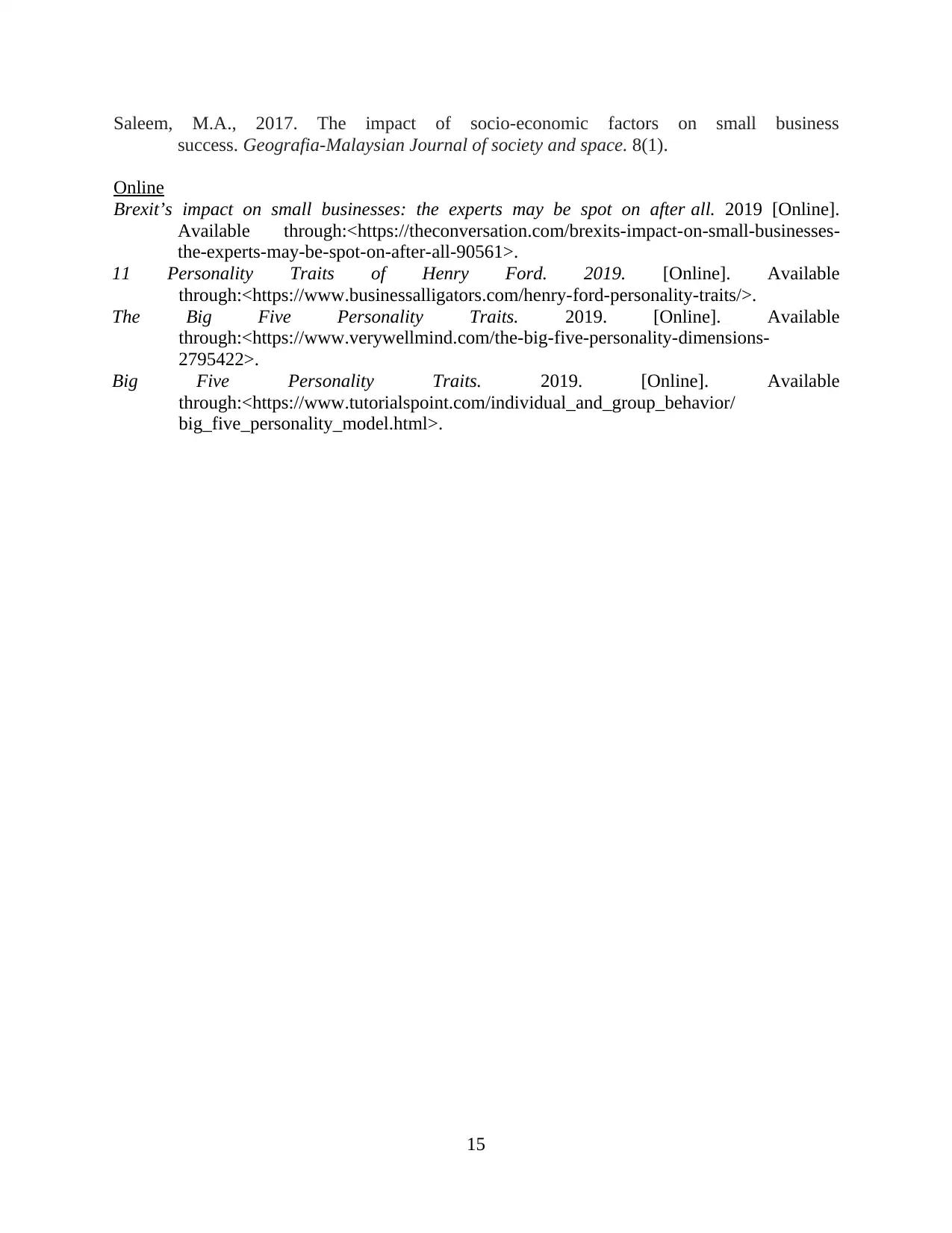
Saleem, M.A., 2017. The impact of socio-economic factors on small business
success. Geografia-Malaysian Journal of society and space. 8(1).
Online
Brexit’s impact on small businesses: the experts may be spot on after all. 2019 [Online].
Available through:<https://theconversation.com/brexits-impact-on-small-businesses-
the-experts-may-be-spot-on-after-all-90561>.
11 Personality Traits of Henry Ford. 2019. [Online]. Available
through:<https://www.businessalligators.com/henry-ford-personality-traits/>.
The Big Five Personality Traits. 2019. [Online]. Available
through:<https://www.verywellmind.com/the-big-five-personality-dimensions-
2795422>.
Big Five Personality Traits. 2019. [Online]. Available
through:<https://www.tutorialspoint.com/individual_and_group_behavior/
big_five_personality_model.html>.
15
success. Geografia-Malaysian Journal of society and space. 8(1).
Online
Brexit’s impact on small businesses: the experts may be spot on after all. 2019 [Online].
Available through:<https://theconversation.com/brexits-impact-on-small-businesses-
the-experts-may-be-spot-on-after-all-90561>.
11 Personality Traits of Henry Ford. 2019. [Online]. Available
through:<https://www.businessalligators.com/henry-ford-personality-traits/>.
The Big Five Personality Traits. 2019. [Online]. Available
through:<https://www.verywellmind.com/the-big-five-personality-dimensions-
2795422>.
Big Five Personality Traits. 2019. [Online]. Available
through:<https://www.tutorialspoint.com/individual_and_group_behavior/
big_five_personality_model.html>.
15
1 out of 17
Related Documents
Your All-in-One AI-Powered Toolkit for Academic Success.
+13062052269
info@desklib.com
Available 24*7 on WhatsApp / Email
![[object Object]](/_next/static/media/star-bottom.7253800d.svg)
Unlock your academic potential
© 2024 | Zucol Services PVT LTD | All rights reserved.





